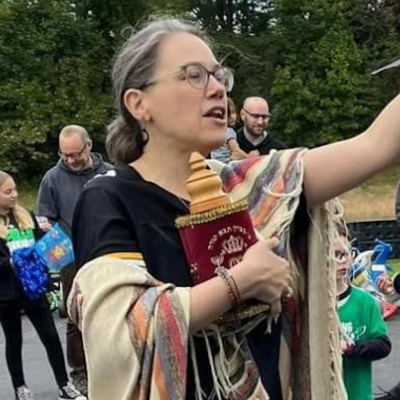“THE ETERNAL said to Abram, ‘Go forth from your land and your birthplace and your father’s house to the land I will show you. And I will make you a great nation and I will bless you and make your name great, and you shall be a blessing.’” (Genesis 12:1-2)
As Lech Lecha begins, we are properly introduced to Abram, who will become Abraham, the first father of the great nation of Israel. We are also introduced, in the very same verse, to the Land of Israel and the idea of a homeland. From the start, this concept of homeland is tied not only to Abram’s personal identity and spiritual journey but to the national identity of those who would come after him, who bear his name.
How powerful is this promise of a homeland — though, as we know, it also comes with immense challenges. I write these words just a few days into what is now being called the Simchat Torah War, though there is nothing happy about it. I feel profoundly numb and sad by what I have already witnessed and dread for what I know is yet to come.
Permit me to take refuge in the words of Torah as we struggle for perspective concerning our homeland. As the parshah unfolds, we find that the narrative gives primary focus to Abram’s relationship with God. Land rights are portrayed as deriving from that relationship; they are a secondary aspect of God’s covenant with Abram. Abram’s seemingly abrupt departure from the familiarity of his father’s house inspires midrashim telling of his great faith and courage. He is Abram, smasher of idols. And the biblical narrative bears this out: In next week’s parshah, he challenges God’s plan to destroy Sodom and Gomorrah, but then he trusts that God has a plan for something greater than himself when God orders him to sacrifice his son Isaac.
Find more commentaries on Lech Lecha.
It is hard to imagine we would have the faith and courage of Abram, yet here we are again, sending our children off to war with our hearts in our throats. I pray that, like Abram, we can also stand up for humanity and decry collective punishment in any form, even as we rage and grieve for our slain innocents.
God promises that Abram will be a “goy gadol,” meaning a great nation or people. Here, goy has a different connotation, biblically, than its synonym am. Am is a nation, a political entity; goy tends to mean more a people who are descended from a common ancestor (in this case, Abraham). This goy becomes great through the strength of their covenantal connection with God and one another. This is what it means to be a blessing.
But how shall we be a blessing? It is certainly not by our name alone but through our righteous actions. Abram’s journey toward this promised land is shaped by his choices — to speak up, or to remain silent; to hide, or to reveal the truth of who he is. His choices don’t always inspire blessing, but Abram faithfully perseveres, learning as he goes. So, too, it is with us.
It is theologically complicated to be a people tied to a homeland. Some of our people have rejected or distanced themselves from such a notion because of the harm perpetrated in taking possession of such land (see: the whole book of Joshua) based on a belief that we have a divine right to it (see: the whole of Deuteronomy).
However, it is important to note that the Torah doesn’t tell us only one thing with regard to homeland. Leviticus tells us that land is not a gift but a loan, and that we only merit to receive the fruits of the land if we act in accordance with the Divine will (see especially Leviticus 25:18-24). And here, in Genesis, the covenantal promise of land is secondary to the establishment of a righteous, faithful people.
Find more commentaries on Israel / Palestine.
In his commentary on Parshat Lech Lecha, Rabbi Shai Held notes that when parting ways, Abram and his nephew Lot chose land based on different criteria. Lot chose land that was well-watered and promised an abundant yield, though it meant also pitching his tent with “the wicked, hard-hearted sinners” of Sodom (Genesis 13:10, 12-13), while Abram settled for a land because he desired peace with his family and neighbors, saying, “If you go north, I will go south; if you go south, I will turn north.” (Genesis 13:9) Held writes, “Abram understands that, ultimately, the land is a gift, not an earthly possession — and so he refuses to grasp it too tightly.” God notices this choice and only then expands the promise of land. Previously, in Genesis 12:7, God had said, “I will assign this land to your offspring”; now that promise is extended geographically “to the north and south, to the east and west” and in time, “for I give all the land that you see to you and your offspring forever.” (Genesis 13:14-17)
Land, for Jews and all peoples, equals safety, security, and sustained fruitfulness. It is home. May we always be grounded in the knowledge that the gift of land and the blessing of home hinges entirely on the choices we make, day after day, to co-exist peaceably with others, as neighbors, as family.
My gratitude to Dr. Tamar Kamionkowski in helping me to develop these ideas.
Rabbi Anna Boswell-Levy is the spiritual leader of Congregation Kol Emet in Yardley, PA. She was a board member of T’ruah for 10 years and served as its co-chair from 2013-2015. She wrote the first “Torah from T’ruah” d’var for Shavuot 5774/2015.

